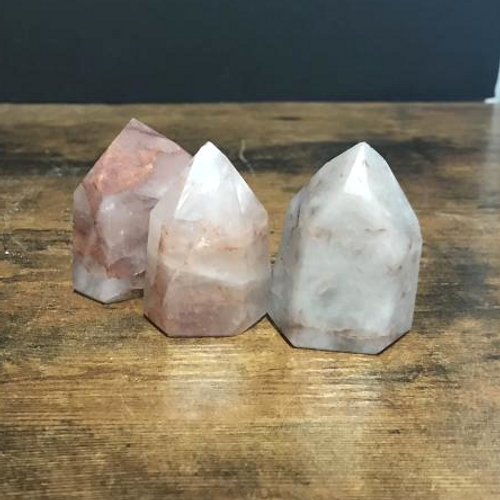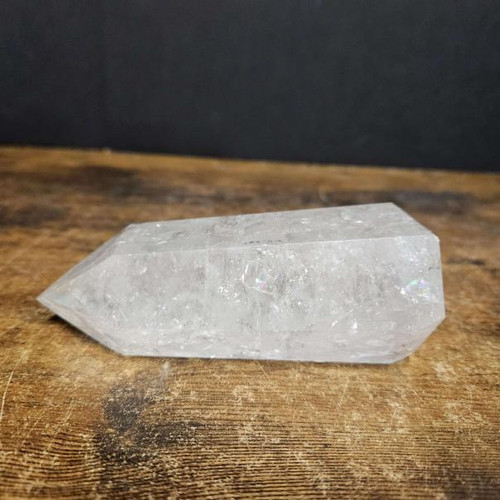Product Description
Quartz Hematoid Tower priced by weight in grams
Mineral Information:
Hematoid Quartz, also known as Fire Quartz or Red Quartz, is a unique variety of quartz that contains inclusions of hematite. It is characterized by its clear quartz base with reddish-brown or orange-red streaks, patches, or inclusions running through it. These inclusions are typically composed of hematite, which is an iron oxide mineral.
The combination of clear quartz and hematite creates a visually striking stone with a vibrant appearance. The intensity and distribution of the red color can vary, ranging from subtle streaks to more prominent patches or patterns throughout the quartz crystal.
Hematoid Quartz is valued for its aesthetic appeal and is often used in jewelry and decorative objects. Its distinct coloration makes it a popular choice for creating unique and eye-catching pieces.
Metaphysical Meaning:
Hematoid Quartz is believed to possess grounding and balancing energies, as well as the amplifying and purifying properties of quartz. Hematoid Quartz is often associated with promoting courage, vitality, strength, and mental clarity. It is also thought to aid in manifesting goals and intentions.
Mineral Care:
Hematoid Quartz, like other varieties of quartz, is generally considered to be a durable and hard mineral. However, it is still important to handle Hematoid Quartz with care due to its crystal structure and potential factors that can affect its fragility:
-
Crystal Structure: Hematoid Quartz has a hexagonal crystal structure, which contributes to its overall durability. Quartz crystals, including Hematoid Quartz, are relatively hard with a Mohs hardness of 7, making them resistant to scratching and everyday wear.
-
Inclusions and Fractures: Hematoid Quartz contains inclusions of hematite, which can create patterns or specks within the quartz. While these inclusions do not significantly impact the overall strength of the quartz, they may contribute to potential weak areas or internal fractures. These weak spots can make the crystal more susceptible to breakage if subjected to excessive force or pressure.
-
Sharp Edges and Points: Like other quartz crystals, Hematoid Quartz may have sharp points or delicate edges. These areas are more vulnerable to chipping or breakage if they come into contact with hard surfaces or experience accidental impacts.
To minimize the risk of damage to Hematoid Quartz, it is recommended to follow these guidelines:
-
Handling: When handling Hematoid Quartz, hold it securely but avoid applying excessive pressure or gripping it too tightly. Support the crystal from the sides or base, especially if it has sharp points or delicate edges.
-
Storage: Store Hematoid Quartz crystals in a safe and secure location, preferably individually or separated from other harder minerals or objects that could potentially cause damage through contact or impact.
-
Cleaning: Use gentle cleaning methods for Hematoid Quartz, such as rinsing it with lukewarm water or using a soft cloth. Avoid harsh chemicals or abrasive cleaners that could damage the crystal's surface or its overall appearance.
-
Protection: If you transport or display Hematoid Quartz, consider using protective padding or containers to prevent accidental impacts or collisions.
By handling Hematoid Quartz with care and being mindful of its potentially delicate edges, internal fractures, or inclusions, you can help preserve its beauty and integrity over time. While quartz is generally considered durable, it is still possible for it to chip or break if subjected to significant force or pressure.
Disclaimer:
No information here is intended to diagnose, treat or cure ailments or afflictions of any kind. One should always consult a medical professional if a serious issue presents itself.




















